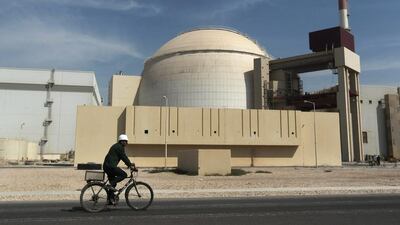Iran declared yesterday it is prepared to give the UN’s atomic watchdog wider inspection powers as part of what Tehran has billed as its “breakthrough” proposals to resolve a decade-old nuclear dispute with the West.
The EU’s top diplomat, Catherine Ashton, said Iran and the six other countries in Geneva agreed that the talks were “substantive and forward looking”.
Underscoring the positive mood, the Iranians and the P5+1 — the five permanent Security Council members and Germany — said talks would resume in Geneva on November 7.
Allowing snap inspections of its nuclear sites appeared to be the first specific indication of what concessions Iran might be prepared to make in return for the removal of sanctions hammering its vital oil and banking sectors. But Iran’s state television suggested this was conditional on the West recognising Tehran’s right to enrich uranium.
In Geneva on Tuesday, Iran presented a “comprehensive” three-stage road map for ending the nuclear standoff in talks with six world powers, including the United States. Western nuclear and sanctions experts spent yesterday combing through the Iranian proposal before the two-day talks ended in the evening.
Iran’s foreign minister, Mohammad Javad Zarif, said the follow-up round of negotiations next month would give them time “to acquire the necessary readiness regarding the details of Iran’s plans and the steps that they must take.
Details of this week’s negotiations — the first since Iranians elected the relatively moderate president, Hassan Rouhani, in June on a platform of engagement with the West — were being kept confidential. But Iran’s deputy chief nuclear negotiator, Abbas Araqchi, said the “last step” of Tehran’s proposals included the possibility of accepting an “additional protocol” to the Nuclear Non-Proliferation Treaty.
The protocol is seen as a vital tool for the UN’s Vienna-based atomic watchdog, the International Atomic Energy Agency, to ensure that a country does not have any hidden nuclear work. Iran’s acceptance of it would help resolve the nuclear standoff, John Kerry, the US secretary of state, said last month.
Iranian state media reported that Tehran also was offering to reduce its level of uranium enrichment — a key demand of the six world powers, which comprise the US, China, Russia, Britain, France and Germany. And it appears that Iran has offered to reduce the number of centrifuges it has spinning.
Iran insists its nuclear programme is solely peaceful in nature, while the West and Israel suspect it is aimed at achieving a weapons capability.
Iran has drawn red lines, however, insisting it will not accept demands to suspend uranium enrichment — which has become a matter of national pride — nor will it ship stockpiles of purified material abroad.
mtheodoulou@thenational.ae

